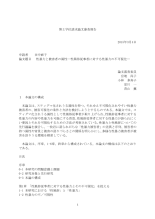4 0 0 0 IR 女性のアンダーヘア処理と性的偏見
- 著者
- 田中 麻子
- 出版者
- 国際基督教大学ジェンダー研究センター
- 雑誌
- Gender and sexuality : journal of Center for Gender Studies, ICU
- 巻号頁・発行日
- no.9, pp.91-112, 2014-03-31
4 0 0 0 OA トラウマとジェンダーの相互作用:精神病理・逸脱・創造性
- 著者
- 宮地 尚子 後藤 弘子 青山 薫 ケン クリアウォーター ガルヴァス イシャ 紀平 省悟 菊池 美名子 栗林 美知子 松村 美穂 嶺 輝子 宮下 美穂 中島 啓之 仁科 由紀 坂上 香 田辺 肇 田中 麻子 ヴァーナー チャン リル ウィルス 吉岡 礼美
- 出版者
- 一橋大学
- 雑誌
- 基盤研究(A)
- 巻号頁・発行日
- 2013-04-01
トラウマとジェンダーの相互作用を、(1)精神病理的側面から、(2)犯罪行為や逸脱現象の側面から、(3)文化創造的な側面から探り、明らかにした。(1)では海外研究協力者との共同研究や、臨床家、脳科学やジェンダー学等の専門家らによる共同研究会議を実施、トラウマの臨床的課題について検討した。(2)では刑事司法におけるストーカーや性犯罪事件の取り扱い、女性薬物依存症者のトラウマと社会復帰、性労働従事者への暴力について分析した。(3)では参加型アートプロジェクトの実施、参与観察を行い、トラウマからの創造性について考察した。(1)~(3)を統合し、成果を著作やウェブサイト等の形にまとめ、国内外で発表した。
2 0 0 0 IR 性暴力と被害者の属性 : 性風俗従事者に対する性暴力の不可視化
1 0 0 0 OA 女性のアンダーヘア処理と性的偏見
- 著者
- 田中 麻子
- 出版者
- 国際基督教大学ジェンダー研究センター
- 雑誌
- Gender and Sexuality (ISSN:18804764)
- 巻号頁・発行日
- no.9, pp.91-112, 2014-03-31
Pubic hair removal has become very normative in recent years, especiallyfor young women in western countries. It has also influenced contemporaryJapanese women in their twenties and thirties. On one hand,“Hygienina,” which is derived from “Hygiene(originally meanscleanliness)”, has been a focal point of cleanliness and fashion in Japan. Onthe other hand, many Japanese women are hesitant to remove all of theirpubic hair because of the stereotype that they are forced to remove it.Further, removal of all of the hair is seen as lewd and instigates socialprejudice. My research was investigated Japanese women’s experiences ofpubic hair removal and social awareness about female genitals and pubichair removal in Japan. I interviewed 65 women who have removed theirpubic hair, and found that the half of interviewees had experiences ofremoving all of their pubic hair, and hair removals were performed for thesake of cleanliness and not for reasons related to sexual activities. I alsoconcluded that in comparison with western countries, Japan has a strongsocial norm not to remove all pubic hair and sexual prejudice againstpeople who deviate from that norm. Furthermore, my research clarifiedthat these women are not only overwhelmed by social norms, but they arealso actively engaged in trying to change social awareness. They are alsobuilding self-esteem through enjoyment of pubic hair removal experience.
